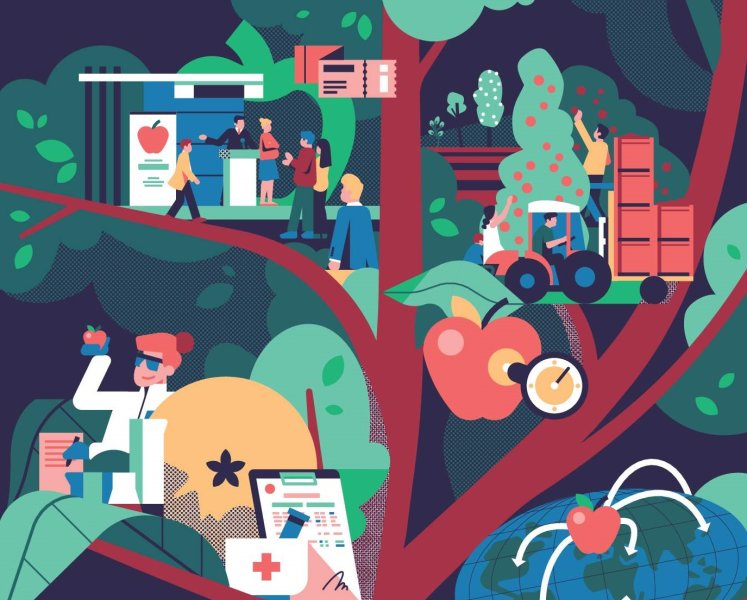
„Agriculture has survived to this day because it has constantly reinvented itself.“

Foto credits of the whole article © Patrick Schwienbacher
Tradition and constant change in the South Tyrolean apple industry
*from ipoma Issue 01, “Future-proofing the Apple”, Ex Libris 2020
For anyone setting out to explore the future of the South Tyrolean apple, the Pieracher farm in Signato is a good place to start. In a picture postcard landscape some 800 meters above sea level and with South Tyrol’s capital city at their feet, apples are ripening across six hectares of terraced orchards. Some of these varieties haven’t yet made it to the retail shelves due to the small quantities harvested, but already carry tempting brand names like SweeTango.
„They are quite time-consuming to harvest because you have to cut the stalk off each
apple to stop it piercing any others,” explains farmer Andreas
Rottensteiner, pointing to the still-immature small red fruits.
“But in terms of taste and consistency, they are premium
apples. You just can’t get better than these – so I’m hoping the
price will reflect the extra work they involve.“
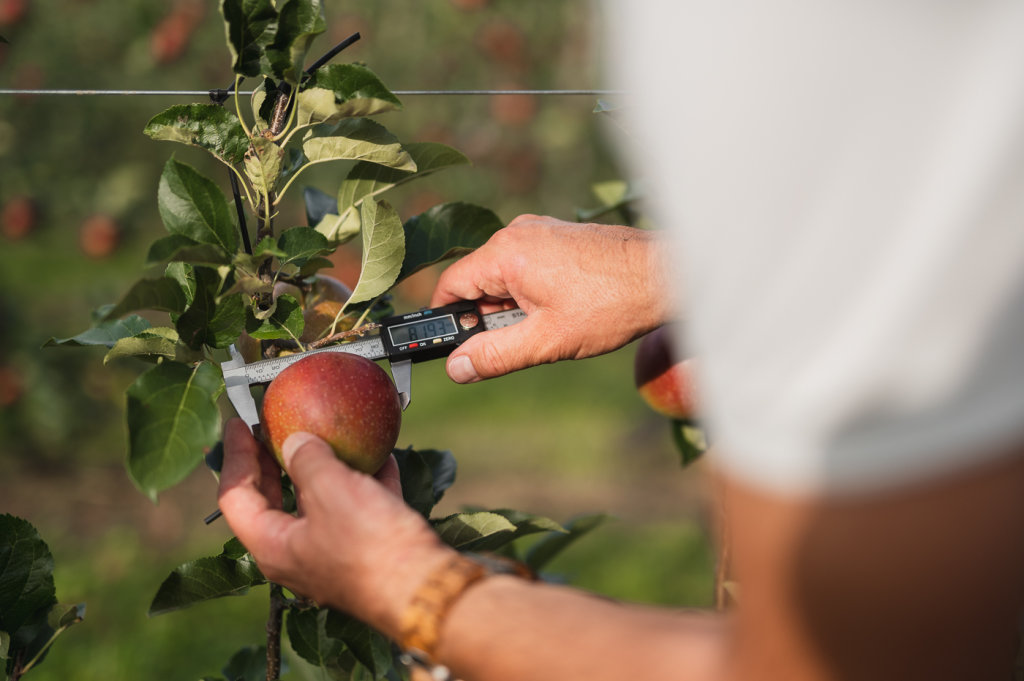
“Agriculture has survived to this day because it has constantly reinvented itself,” Andreas Rottensteiner believes.
“So the biggest mistake you can make is to do nothing and always stick with the same variety.”
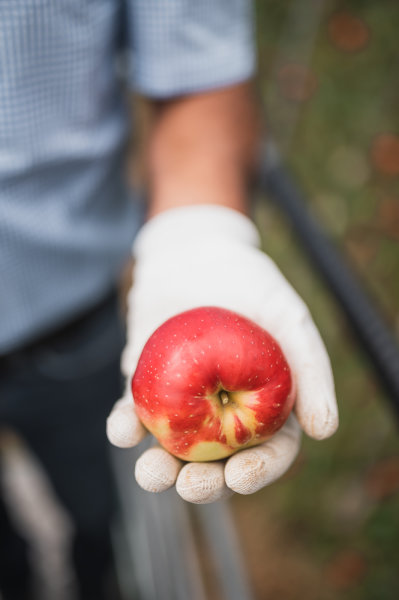
By continuing to produce top quality apples, say the large South Tyrolean producer associations, the above-mentioned VOG and the Val Venosta Fruit and Vegetable Producers’ Association (VIP). But they can’t keep this promise by resting on the laurels of good climatic production conditions. Variety innovation, natural production methods, technological leadership, and unrivalled service are the key to securing the future of over 7,000 apple farmers across the province.
The VOG and the VIP may not always share the same focus. But when it comes to issues such as innovating the product range, they speak with one voice, and have done ever since a joint R&D department was set up 18 years ago: the Variety Innovation Consortium South Tyrol (SK Südtirol). Back then, the meteoric rise of Pink Lady made it abundantly clear that alongside the standard varieties, a new market was emerging – a market for managed varieties, whose variety and trademark rights are in the hands of private companies or consortia. In return for higher tree prices and royalties, growers are granted cultivation rights and, along with them, the hope of achieving better farm gate prices in the future through controlled cultivation and exclusive marketing rights. At the same time, these new apple varieties are notable for their special organoleptic characteristics, ranging from ultra-crisp flesh and completely new flavor notes to excellent shelf-life qualities.
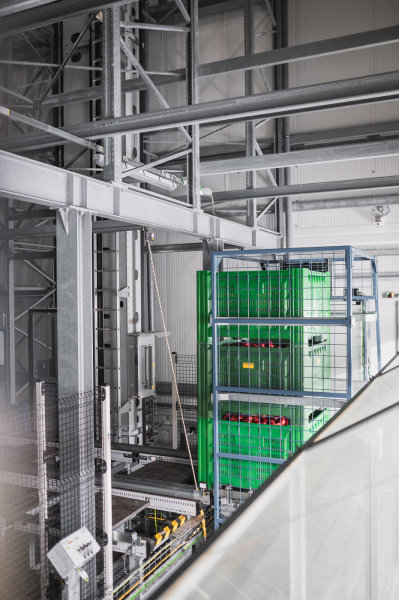
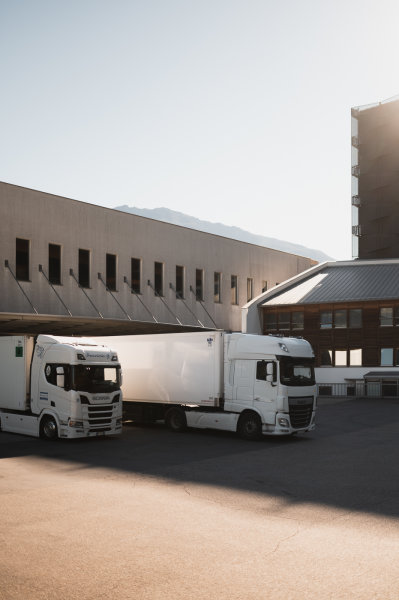
Around 90 percent of its apples are grown according to the guidelines of integrated production, while ten percent are organically produced on 1,000 hectares.

An interesting microclimate can be found in the Venosta Valley in the west of South Tyrol, as well. At between 500 and 1,000 meters above sea level, this is the highest-altitude homogeneous growing area in Europe, with lots of sunny days, low rainfall, cool nights, warm days, and a constant breeze: the Venosta wind. In these conditions, even a standard variety such as Golden Delicious scales new heights with an attractive red blush. That’s why the popular high-altitude Golden still accounts for around 60 percent of the 320,000 tonnes of apples harvested by Venosta’s VIP cooperative. This organization, which celebrates its 30th anniversary in 2020, has 1,700 family farm members organised in seven apple cooperatives.
All non-ideal Golden Delicious sites in the Venosta
Valley and elsewhere in the region are currently being cleared
to make space for new varieties. There is also a widespread
move towards more natural production methods. Across
South Tyrol, growers are outcompeting each other to incorporate sustainable integrated production practices, from installing stone walls, bird nesting boxes, and wildflower strips to
voluntarily giving up the use of herbicides, a strategy in which Venosta Valley growers lead the field. And it’s the same picture
in organic apples: with 15 percent of the total acreage now
organic, South Tyrol’s apple farmers top the European league
tables for organic produce. This figure leaps to 20 percent in
the west of the province – a rising trend that looks set to continue across all South Tyrolean apple orchards, boosted by a
sustainability program which is currently being developed in
conjunction with agricultural policymakers.
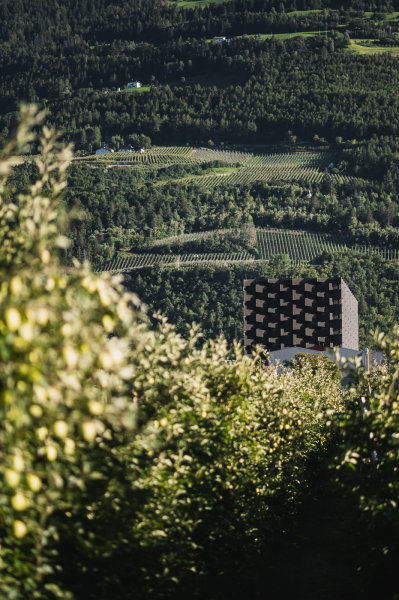
The sales market for Venosta Valley apple producers is less expansive than that of VOG. Around half of VIP’s apples are sold in Italy, with the rest going to Germany, the Iberian peninsula, Scandinavia, and 50 other markets. Within these regions, Venosta Valley producers have a reputation for reliability, whether as own-brand suppliers to large retail chains or innovative packaging specialists. “Consumer behavior changes all the time, family sizes are shrinking, demand for finished products is on the rise, and at the same time consumers want less plastic,” Pinzger says. So the producer association aims for maximum flexibility in the packaging it offers: “As far as that’s concerned, we’re definitely up there at the highest level in the worldwide apple sector.”
That’s the formula South Tyrol’s
apple farmers and their cooperatives apply to overcome the
challenges of a difficult market. The future of the South Tyrolean apple depends on keeping one step ahead of everyone else. Identifying and exploring new avenues and leading the field, whether in terms of quality, variety innovation, service, or technology, are specialties in the South Tyrolean apple industry which enable it to keep reinventing the humble apple over and over.
